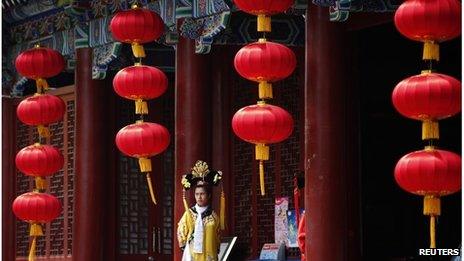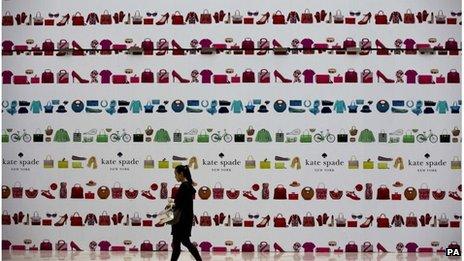Why fixing China could hurt the West
- Published
- comments

The pace of growth in China has slowed
America's economic revival - difficult to judge whether it is a renaissance - has been based on cheap energy and cheap money.
Cheap energy is the product of fracking.
And cheap money has not just been the last few years of money creation and the cut in official interest rates by the US Federal Reserve - the central bank's response to the 2008 crash and Great Recession.
Whether the likes of Larry Summers, the former US Treasury Secretary, are right that the central bank will have to keep interest rates less than zero, after adjustment for inflation, if unemployment is not to settle at socially intolerable levels, there has been another longer-running contributor to America's cheap borrowing costs: viz, the way that the Chinese government has invested the country's massive trade and current account surpluses, in US government debt, thus bolstering the price of that debt (to remind you, as if you didn't know, when debt or bond prices are high, yields or interest rates are low).
That current account surplus has shrunk since the crisis of 2008, so Chinese purchases of US government debt, or treasury bonds, have diminished.
But what if China is embarking on a fundamentally new policy that would deprive the US government of all that almost free cash?
Well Diana Choyleva of Lombard Street Research argues that is happening.
It is not that she sees China exporting less capital or money to the rich West. Quite the reverse. She thinks this will increase. But the money will no longer come directly from the government, but much more from individuals and businesses.
They, she believes, would be relatively uninterested in owning low-yielding US government bonds.
Instead they would go for riskier assets, especially property ("uh oh" you might say - and we are already seeing some of this in any case).
So, on her analysis, America - especially the government, but potentially all borrowers (because all interest rates tend to be set relative to the price paid by Washington) - will have to brace itself for permanently higher interest rates.

Many argue the Chinese economy should be rebalanced towards consumer spending.
Why might Choyleva be right?
Well there are two reasons.
First the Chinese government has embarked on liberalising capital controls, on making it easier for Chinese savers to invest abroad. The reforms may be incremental, but the direction of travel is clear.
Second, it is quite difficult to see what else the Chinese government can do, if it wants to avoid years of - by its standards - relatively low growth.
As I have been banging on about for months, the evidence is impossible to ignore that China became too dependent on debt-fuelled investment in property and infrastructure since 2008, to compensate for the collapse of its export markets in the West.
Whether there is already a debt and property bubble of dangerous proportions is hotly debated (and see what my colleague Linda Yueh has written about this today and my earlier notes).
However the Chinese authorities have recognized that debt-fuelled growth is not sustainable for the long term. And the none-too-reliable Chinese official statistics, including a wodge published yesterday, are showing a slowdown in the pace of lending, external.
That is why the Chinese economy is struggling to hit the government's growth target for this year of around 7.5%.
Many would argue that the best long-term solution would be a fundamental rebalancing of the Chinese economy away from massive debt-fuelled investment and towards consumer spending.
The government talks the talk of boosting consumption. But easier said than done, in an economy with a deep-seated culture of putting money aside for rainy day or catastrophe.
Thus statistics published today showed fixed asset investment and retail sales both slowing down and rising slower than analysts' forecasts - which reinforces the picture of a slowing Chinese economy.
But perhaps more striking is that as both investment and consumption growth slows, there is no chance of consumption displacing investment as the main engine of growth.
Which is why there is a high probability, with the US and Europe recovering and able to buy more Chinese-made stuff again, of China's government reverting to its traditional export-led growth model, but with a new twist.
The twist would be, as I mentioned, that there would be far fewer restrictions on Chinese people and businesses being able to invest their wealth overseas.
Were this to happen in scale, the exodus of capital would depress the value of the RMB, China's currency - which is exactly what Chinese exporters want, and would once-again pump up China's trade and current account surpluses.
Which some of you may find faintly depressing. Because a big cause of that huge mess we've been in for years was the massive flows of cheap goods and cheap capital from east to west in the boom years, which stimulated excessive consumer spending, hollowed out our industries and led to insane mispricing of assets.